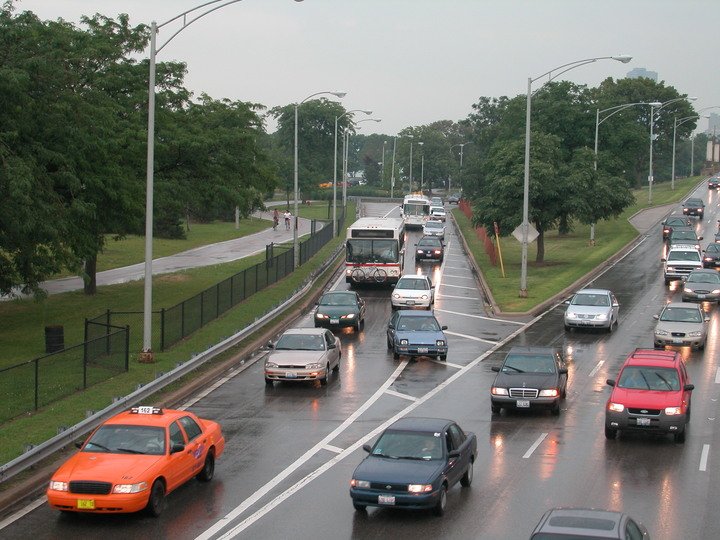State and local officials leading the North Lake Shore Drive reconstruction project have eliminated the best option for bringing a dedicated transit lane to a vital Chicago corridor.
We strongly oppose this decision and will work with our members, supporters, and partner organizations to reverse it.
The reconstruction effort is a once-in-a-lifetime opportunity to create healthy, sustainable, and equitable transportation along Chicago’s North Lakefront. In 2018, Active Trans lead a coalition of ten business and civic groups calling for dedicated space for transit.
The Illinois Department of Transportation, which is leading the project, surveyed residents and found that above all else people wanted improvements to public transit along the Lake Shore Drive. And more than half of survey respondents said that slow and unreliable bus service forced them to drive instead of take transit on the road. It’s easy to understand why the Chicago Transit Authority opposes eliminating this option from the design.
Support for a robust, transit-centered alternative is clear.
____________________________________________________
Take action now to reverse this decision.
____________________________________________________
Bus-only lanes provide dedicated space for buses to move quickly and reliably through the corridor. Already, cities across the country, like New York and Seattle, have reaped the benefits that dedicated space for buses can provide our transit networks.
Removing this option before the public gets a true opportunity to evaluate it undermines the public interest and sets back the goals of improving peoples’ mobility and health while addressing climate change.
Officials sidelined the truly transformative option of bus-only lanes in favor of advancing the managed lane concept to the next phase of decision making. The managed lane concept, which would allow private vehicles to pay a toll to access an express lane along with buses, is a weaker alternative that does not achieve the same transit benefit as bus-only lanes.
It also relies on a technically complex and politically volatile tolling system that can easily be watered down before ever being implemented. Even worse, the managed lane creates a two-tiered transportation network that provides an advantage to people who can pay tolls for access to a faster travel lane, while everyone else is left with substandard transit service.
In a time when the clarion call for social justice is ringing clearly, spending billions of dollars to further entrench inequitable car-oriented transportation should not be under consideration.
The managed lane concept will join two others in the next round of public engagement and technical analysis. These other options include one design that is mix of helpful but largely superficial changes to the existing roadway and another concept that provides dedicated transit space by expanding the road into treasured lakefront parks, another political non-starter.
We shouldn’t limit ourselves to these sub-optimal choices when we could be considering a forward-thinking approach.
While this project is likely still several years away from breaking ground, the decisions made now will dictate mobility along our lakefront for generations to come.
Both the bus-only lane and managed lane concepts scored well on the project’s evaluation criteria with only marginal differences. These differences were largely due to the bus-only lane creating somewhat worse conditions for driving, which actually can play a positive role in motivating more people to use transit.
But the original sin of the North Lake Shore Drive project was to establish as its guiding light the goal of improving conditions for all modes, ignoring the clearly divergent impact driving and transit have on health, sustainability, and equity. We cannot meet the challenges of today by applying the tools of yesterday.
The bus-only lane concept should be advanced alongside the managed lane concept. The next round of evaluation will include critical inquiries into environmental and equity impacts; advancing both of these concepts will give the public the opportunity to truly understand the benefits and tradeoffs involved with each design.
We are calling on Governor Pritzker, Mayor Lightfoot, their transportation agencies, and the project team to revisit this decision before it’s too late. We need leadership now before we continue to down this all-too-familiar path that looks backward instead of forward.
____________________________________________________
Take action now to reverse this decision.


